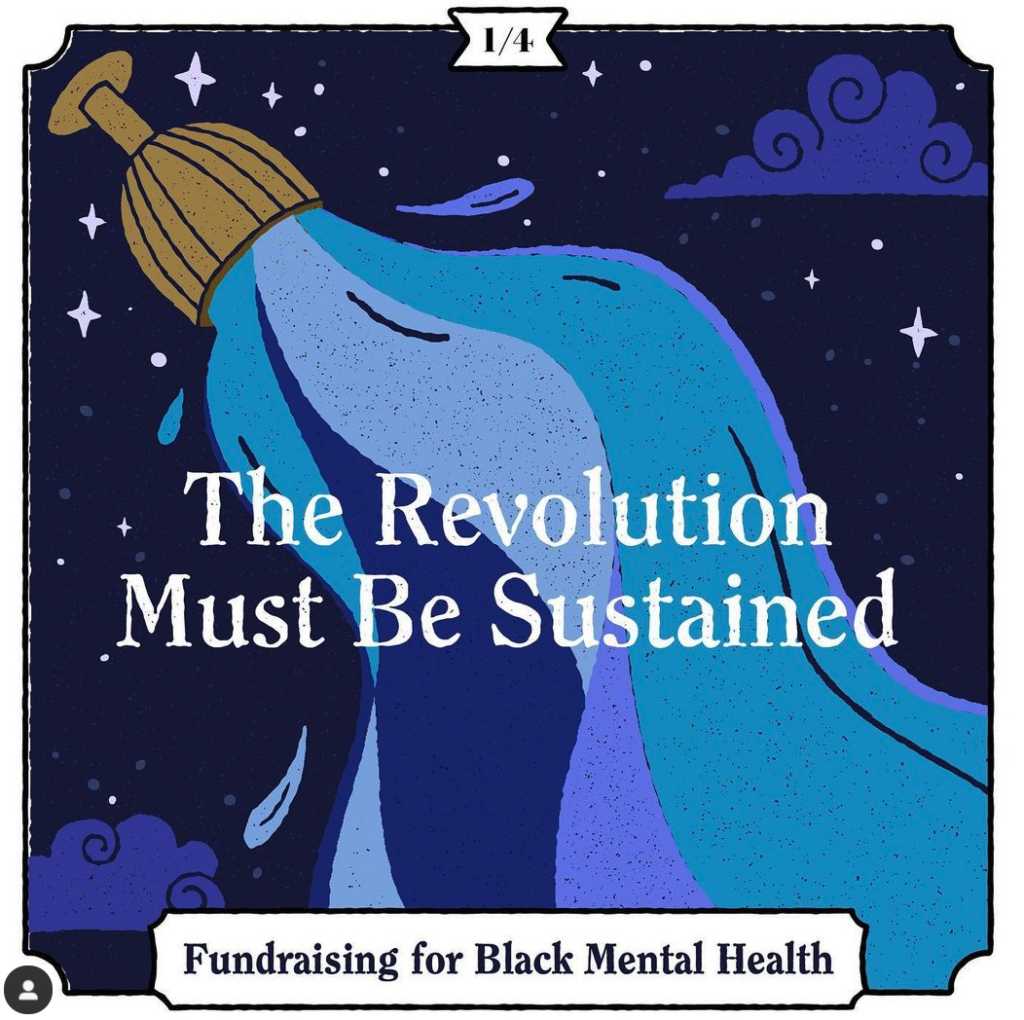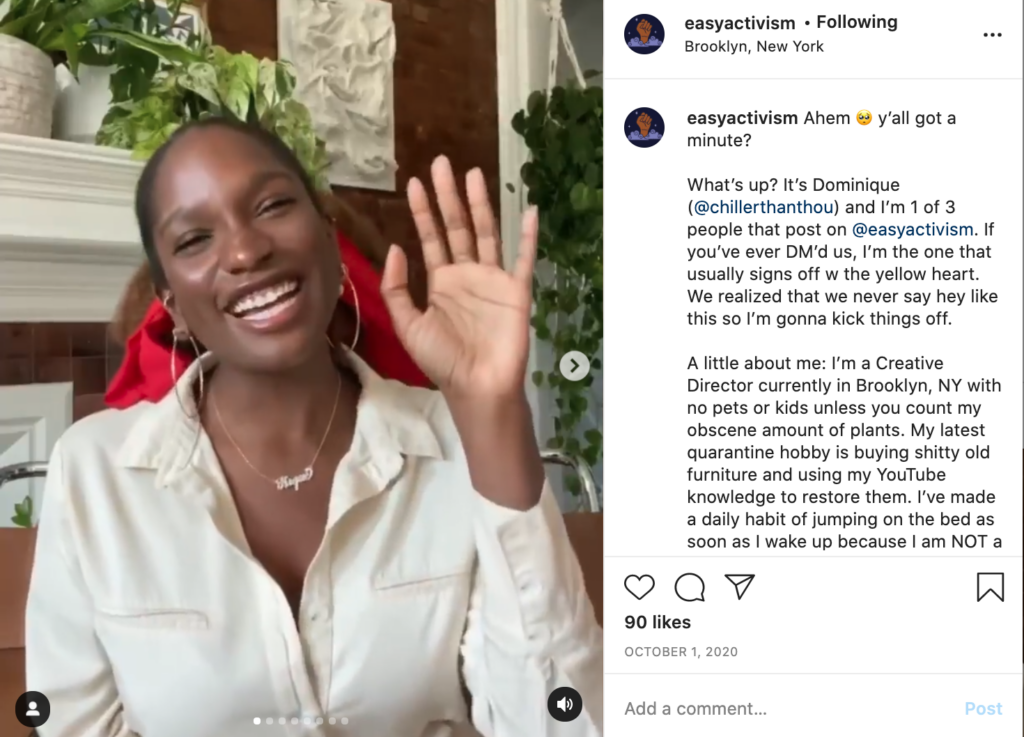New York City resident Dominique recalls the early days after George Floyd’s murder in May 2020, when she and her friends Hannah and Stephanie were looking for ways to help the Black community. Like much of the nation, they were grappling with feelings of anger, sadness, and frustration that arose in response to the murder of Floyd, as well as the countless others who came before him.
And although they come from different backgrounds and walks of life–Dominique is a creative director, Stephanie is a registered nurse, and Hannah works in advertising–it’s clear that these friends and activists share a deep sense of camaraderie and a commitment to racial justice. “We were all FaceTiming through really hard times,” Dominique remembers. “And I think what we realized, plain and simple, is that we needed to find our own way to sustain the movement [for Black Lives]. Collectively we recognized that there was a need for leaders on a smaller scale. There was no effort too small, and we had all the tools and all the time in the thick of quarantine to figure out exactly what that was for us.”
They were heartened by the folks they saw stepping up in solidarity, but they also knew that it was important to make the movement last. “I’ve personally seen the Black Lives Matter movement die so many times that it was really about playing defense, you know,” Dominique says.

So in trying to find a way to help, they were looking to focus on sustainability. Stephanie adds, “As Dominique said, a lot of the times we see [all the Black Lives Matter movement] momentum die down. So between COVID and the protests, we knew that people in general–but especially the Black communities affected the most by this–would be more mentally and emotionally exhausted than usual.”
“And so it was really about, how can we fill the cups of the people that need it most? [That meant] Black people who are experiencing this trauma, but also the Black mental health professionals who were affected by COVID and who are experiencing the same trauma that they’re helping other people with,” Dominique says.
In order to do that, they knew they had to define and maintain a laser-like focus on an initiative. Hannah remembers using social media to solicit input from her neighbors about what they needed. “I took to Instagram and [asked people], ‘What do you need? What does the community need?’ And I saw that Black people said they needed mental health resources and [that sort of thing]. They were tired. But then non-Black people wanted direction from small-scale leaders because they felt like they didn’t quite know what to do. And so that was where we all kind of [said], okay, we will step up to the plate and be the small peer leader.”
By taking the time to simply ask their neighbors what they needed, they were able to figure out how they could help their Black neighbors process and cope with the multiple traumas that have emerged this year. They named their project “Easy Activism” and decided to make it their goal to provide over 200 Black people with one month of free, individualized therapy. “I think that like the stigma of therapy, especially as a Black person in Black neighborhoods is very real. And so any way that we can come closer to de-stigmatizing that, and also helping both groups of these people fill their cups, is important,” Dominique says.

And so they began fundraising. They used their existing connections and knowledge to spread the word about their project and hold folks accountable when they expressed interest in contributing. Soon, they were seeing an overwhelmingly positive response. As donations came in, they were also reaching out to therapy networks and negotiating packages they could provide to folks who were interested in the therapy. They made sure the services were as inclusive as possible. “We have everything from LGBTQIA+, to traditional talk therapy, to more holistic meditation approaches–just so we have something for every type of person,” says Stephanie.
After hearing about ioby from a mutual friend who does a lot of nonprofit work, they decided to start a crowdfunding campaign to help them increase their outreach. “We chose ioby because of its mission to create community-led, positive change. Once we had a look, it was a no-brainer–we inquired immediately. To be fiscally sponsored is key, and an added bonus, but ioby’s mission aligned perfectly with ours. ioby allowed us the opportunity to create a means for anyone to help serve and continue to serve a community in need,” they say.
Their ioby campaign has been a huge success, raising over $15,000 in the first two weeks and $36,000 overall (and counting!). One of the reasons they attribute to their success is their narrow, laser-like focus on a single cause. Dominique says, “I think when it comes to doing any project, but especially with fundraising activism work, it’s important to keep your North Star. The more specific that your North Star can be, the easier it is to execute.”
Another reason they’ve been able to make such an impact? A shared commitment to the project–and to supporting one another as a team. As Hannah puts it, “There were moments where we got stuck, but at the end of the day, we’re all best friends and we’re all very understanding and patient listeners. There were times when one of us was burnt out and the other one was there to carry their weight and just suggest a new solution to help us get to the next step.”
“We kind of are doing what our mission is going for,” adds Dominique. “Filling each other’s cups, too.”
“Yeah,” Stephanie agrees, and, embodying the group’s commitment to lifting one another up, credits Dominique with making a powerful analogy. “‘We saw leaders closing the streets and painting “Black Lives Matter” on them,’ she said, ‘but now they’re back open with traffic driving over them, and that’s what we want to address. We can’t look at [the Black Lives Matter movement] as something to move on from. We have to take care of them and take care of our community in a sustainable way.’”
Check out ioby’s 2020 Giving Report for more awesome stories of positive change.